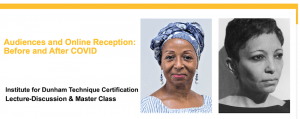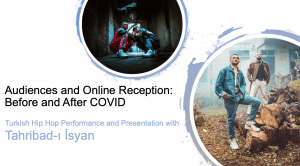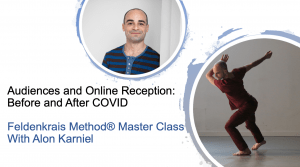Audiences and Online Reception: Before and After COVID is a year-long series of online symposia that examines the impact of COVID-19 and quarantine experiences on artistic and cultural production. Please join us for the following Spring 2021 events. All programming is FREE and open to the general public with registration.
The Role of Cinema in Coping with Burdensome Pasts
Monday, March 1st // 12:00-1:00 PM (ET)
Zoom // Registration Required // go.osu.edu/Savic
Whether it is used to glorify cultural identities, as an incubator for stereotypes and prejudice or to promote diversity, cinema shapes public opinion. In this talk, Miroslav Savić will discuss the role film plays in the cacophonic atmosphere of the post-Yugoslavian cultural space where the old unified cultural model transforms into the multitude of new, still maturing models. If three sides tell three different stories about the same event, is there hope for reconciliation? He will argue that the new generation of artists, children of those who directly participated in the conflict, may have the key.
Miroslav Savić is a Serbian film director, writer, and teacher. He wrote and directed several short fiction movies and several theatre plays. He taught film production and directing actors at Columbus College of Art & Design (2019-2020). He currently works on an artistic research project that aims to examine complementary roles of documentary and fiction filmmaking methods and the potential of hybrid film to overcome limitations of clean-cut genres.
Movement Practice with Dege Feder
Wednesday, March 10th // 8:30-10:00 AM (ET)
Zoom // Registration Required // go.osu.edu/Feder
Dege Feder is a choreographer, dancer, artistic director, and musician. She danced solo parts in Eskesta Dance Troupe and was among the founding dancers of Beta Dance Troupe. She has served as Beta’s artistic director and choreographer since 2013. She has performed in many international festivals in Germany, France, Columbia, Croatia, South Africa, USA, and more.
The movement practice workshop will be based on a movement language that was developed by Dege in her work with Beta Dance Troupe. This language combines techniques and styles from traditional Ethiopian dance adapted and combined with contemporary dance. The workshop will focus mainly on the Eskesta dance style that concentrates on the upper parts of the body and particularly on the shoulders. This event will feature a question-and-answer session moderated by Dr. Hannah Kosstrin, Associate Professor of Dance.
This is Where We Dance Now: Covid-19 and the New and Next in Dance Onscreen
Online symposium and special issue of The International Journal of Screendance
Friday, March 12th // 8:00-9:15 PM (ET)
Saturday, March 13th // 12:00-1:15 PM (ET) // 2:00-3:15 PM (ET)
Friday, March 19th // 8:00-9:15 PM (ET)
Saturday, March 20th // 8:00-9:15 PM (ET) // 2:00-3:15 PM (ET)
Zoom // Registration Required // go.osu.edu/Screendance
Join “Audiences and Online Reception: Before and After COVID” for an online symposium where authors from the forthcoming special issue of The International Journal for Screendance share their perspectives on how COVID-19 has rewritten the playbook for dance onscreen and dance online.
Activities once on the sidelines of the dance field are the new normal: teaching technique on Zoom, holding online dance film festivals, DJing house parties on Instagram, streaming archival performance documentation, making TikToks. This Is Where We Dance Now will critically examine the changes to dance and screendance practices unfolding in the current era of quarantine and social distancing. Although the long-term implications of this upheaval remain to be seen, for now, we are seeing the culmination of a trend that has been developing over the past two decades or more: now all dance is screendance. For more information about this free symposium, visit https://u.osu.edu/thisiswherewedancenow/
Composition with Danielle Agami
Thursday, March 25th // 3:30-5:00 PM (ET)
Zoom // Registration Required // go.osu.edu/Agami
Israeli choreographer Danielle Agami founded Ate9 as a platform for innovative movement and artistic research. With Ate9 she has created choreographies and numerous site-specific performances and collaborations with local LA institutions. Before founding her own company, Agami danced with Ohad Naharin’s Batsheva Dance Company where she was appointed rehearsal director from 2007-10.
Agami will led a composition master class that will bring participants both inwards and outwards. Class will explain, ignite, and experience a generous exchange of ideas for movement and expression. This event will feature a question-and-answer session moderated by Dr. Hannah Kosstrin, Associate Professor of Dance.
If you require an accommodation such as live captioning or interpretation to participate in this event, please contact Lyndsey Vader at vader.6@osu.edu Requests made two weeks before the event will generally allow us to provide seamless access, but the university will make every effort to meet requests made after this date.
This series is made possible through a Global Arts + Humanities Discovery Theme Special Grant. For more information on upcoming events, visit https://u.osu.edu/audiencesandonlinereception/.




